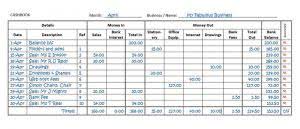E&P Oil and Gas: Key Accounting and Financial Considerations

To help answer your questions we gathered the top questions we frequently encounter. Whether you’re an oil and gas accountant, sole practitioner, CPA, or APAⓇ, we’re here to help. Our course offerings evolve your skills, letting you better serve the people around you. IFS Merrick – Field Operator enables operators to seamlessly capture and validate measurement QuickBooks Accountant data, integrate with SCADA and other data sources, and perform industry-standard calculations. Field Operator simplifies the daily challenge of managing large portfolios of wells and equipment and remote operations.
Key benefits

In the E&P sector, revenue generation is tied to exploration, development, and production activities. Primary revenue streams include the sale of crude oil, natural gas, and natural gas liquids (NGLs), each influenced by distinct market dynamics. Crude oil prices depend on global supply-demand balances, geopolitical tensions, and OPEC production decisions, while natural gas prices are regionally driven by supply constraints and weather patterns.
How can professionals improve their skills with an oil and gas production accounting course?
The American Petroleum Institute (API) offers a comprehensive training program that covers everything from basic petroleum accounting to advanced topics like ASC 932 compliance. Financial statements are prepared under the assumption that the entity will continue to operate for the foreseeable future. It’s a challenge to accurately navigate the severance, royalty, property, sales, and use taxes you face from https://mkr.si/difference-between-journal-and-ledger-accoutning/ mineral rights holders, local and state jurisdictions, and the federal government.

Oil & Gas Accountants
Utilizing accounting software that allows for real-time tracking and reporting of joint venture activities can enhance transparency and reduce disputes. Companies should develop clear capitalization policies in line with IFRS 6 or the US GAAP’s guidance on the capitalization of oil and gas exploration and development costs. These policies should detail which costs are eligible for capitalization and prescribe the method and rates of depreciation, considering both the physical life of the asset and the reserve depletion rate.
Enertia Software: Best for real-time operational insights

Expenses should be recognized in the period in which they are incurred, helping to match costs with the revenue they generate. The accounting debate on how to handle Oil and Gas Income, Expenses, and booking Reserves has been going on for a long time! The issue is so complex, that following is an accounting of the timeline and changes.
- For accounting in the oil and gas industry, best practices are ever-evolving due to technological advancements, macroeconomic conditions, and the continual need to reduce general and administrative (G&A) costs.
- Production cost allocation affects profitability and operational efficiency in the oil and gas industry.
- As an accountant, it’s beneficial to have a repertoire of skills and experience to help you find work.
- The student will be able to understand the industry’s financial practices and government regulations.
- The information provided by Valor in this blog is for general informational purposes only, not to provide specific recommendations or legal or tax-related advice.
- These principles, among others, provide the foundation for financial reporting under U.S.
Leverage Expert Consulting Services

The volatile nature oil and gas production accounting of oil prices and the significant capital investments required for exploration and production make this framework particularly essential. General accounting systems don’t break down lease operating expenses (LOE), depletion, or asset depreciation in the way oil and gas companies need. A specialized accounting system can capture all expenses in real-time, helping to track profitability and to ensure accurate financial forecasting. Oil and gas accountants are responsible for preparing accurate financial statements, including income statements, balance sheets, and cash flow statements.
Upstream activities involve exploration and production, midstream covers transportation and storage, while downstream includes refining and marketing. Each segment has its own accounting nuances, making it essential to grasp these differences for accurate financial reporting. Each method will have its own way of demonstrating costs when it comes to cash flow, so it is crucial to understand the methods in depth in order to anticipate what financial statements will look like. Another critical aspect of joint venture accounting is the allocation of costs and revenues among the partners. This allocation is usually governed by the joint operating agreement (JOA), which outlines each partner’s share of costs and production.

Accounting in the oil and gas industry is a specialized field that requires a deep understanding of both financial principles and sector-specific practices. The complexity arises from the unique nature of exploration, extraction, and production activities, which involve significant capital investment and long-term project timelines. Stakeholders rely on financial statements to assess the financial health of oil and gas companies. Proper accounting practices build trust among investors, regulators, and the public, fostering confidence in the industry. Many oil and gas projects involve joint ventures where multiple companies collaborate. Production costs, also known as lifting costs, are the expenses related to extracting oil and gas from the ground and bringing it to the surface.
- For 169 years, we have grappled with the issue of how to account for the Oil and Gas company’s activities.
- To meet today’s challenges, and anticipate tomorrow’s, you need a partner that truly understands both the past and the future of the energy industry.
- Generic accounting programs often fall short in handling joint venture operations, complex revenue recognition, and reserve reporting.
- This includes negotiating favorable contract terms, implementing joint procurement initiatives, and sharing best practices.
- Let’s break down a couple of the accounting principles and how they affect your processes in oil & gas accounting.
Key Takeaways
We can also help you create business value, raise equity and debt capital, or evaluate strategic alternatives. From cost containment to supply chain management and implementing technological improvements,discover how you can address critical issues with our services. Advanced technology and an evolving regulatory environment are rapidly changing the industry, causing frequent price fluctuations and enhanced production demands. To stay competitive, your business needs to adapt while safely maintaining its operations. The rule updates from 1996 to 2010 made changes to how reserves must be calculated and disclosed, as well as applying some of the reporting requirements to privately held companies, as well as publicly traded companies.
Revenue Recognition Complexities
- Oil and gas accounting is a specialized field that requires a deep understanding of both the industry and its unique financial practices.
- The Full Cost Method states all costs should be capitalized and charged off when revenue is received.
- Adopting joint arrangement accounting practices as per COPAS or similar GAAP standards can help in clearly recognizing and measuring interests in joint operations.
- A general accounting system isn’t built to handle these complexities, which can lead to errors, miscalculations, and compliance issues.
- It’s a good choice for businesses that need affordable, easy-to-use accounting software that integrates with other industry tools.
- The classification of reserves into proved, probable, and possible categories is a crucial step in this process.
To qualify for graduation, students must pass all courses, attain a CGPA of 2.0 or better and complete course requirements within the prescribed timelines. The information provided by Valor in this blog is for general informational purposes only, not to provide specific recommendations or legal or tax-related advice. The blog/website should not be used as a substitute for competent legal advice from a licensed professional attorney in your state. From helping you choose which system best fits your needs and data conversion to software optimization and client training, our staff has decades of experience and is fully equipped to help walk you through the entire process.

